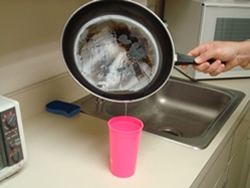
Fats, Oils, and Grease (FOG) Program
Grand Strand Water and Sewer Authority’s (GSWSA) Fats, Oils and Grease (FOG) program was designed to reduce the possibility of sewer pipe blockages and overflows by educating people in regards to how FOG effects the sewer system and how customers can properly dispose of these substances.
FOG gets into our sewer collection system mainly from residential customers pouring the substances down their drains and from commercial food preparation establishments with inadequate grease controls. Fats, oils and grease are a byproduct of cooking and are mostly found in the following:
- Meats
- Cooking oil
- Lard or shortening
- Butter or margarine
Our sewer system is not designed to handle or treat these substances in excess. Over time, without proper disposal of fats, oils and grease, they build up in the sewer system and eventually block collection pipes and sewer lines, resulting in sewer backups and overflows on streets, properties and even in customers’ homes and/or businesses. Overflows may also impact the environment negatively and can result in contamination of ponds, streams or rivers.
FOG that enters the sewer system eventually solidifies and forms grease balls. These grease balls can range in size from marbles to the size of cantaloupes and must be removed periodically. Since the sewer system is unable to handle or treat these substances effectively, GSWSA incurs greater expenditures on the maintenance of the collection systems and/or treatment plants which in turn can lead to higher customer rates. Sewer backups can also cost customers thousands of dollars for the repair or replacement of their damaged property.
To work effectively, sewer systems need to be properly maintained. GSWSA encourages all customers to do their part in maintaining their internal system and to use proper disposal methods as provided below.
Restaurant/Food Preparation Businesses
GSWSA requires commercial operations in the food preparation business to have a grease interceptor with a minimum capacity of 1,000 gallons. A grease interceptor is a concrete structure that is used to trap grease generated from food production establishments. The grease interceptor is generally located beneath the surface in a parking lot or sidewalk area, between the restaurant and the sanitary sewer line. It captures grease and oils from the normal wastewater flow. Grease interceptors receive liquid waste from mop sinks, floor drains and 3-compartment sinks.
The purpose of the interceptor is to help separate the hot, greasy water from other water
generated at a restaurant. The interceptor slows the flow of the hot, greasy water. As this water cools, the grease and oils separate and float to the top of the trap, allowing water underneath this greasy layer to flow down the pipe to the sewer system. Larger-capacity grease traps are needed to provide an adequate retention time to cool water for efficient grease recovery.

Proper Disposal Methods:
Ways in which you as a customer can reduce the amounts of FOG that enters the sewer system is by doing the following:


- Have grease interceptors or traps inspected, maintained and cleaned regularly. (Usually every 6 months they should be pumped out).
- Scrape grease and food residue from dishes and pans into a garbage bag before placing them into your dishwasher or sink.
- Allow grease to cool to a safe temperature after cooking before disposal.
- Only dispose of fat and grease in an approved container or by an approved method.
- Recycle used cooking or motor oil at one of Horry County’s recycling centers.
- First freeze the grease or oil and then throw the hardened oil away on trash day.
- Mix oils with unscented kitty litter, sawdust or sand to solidify the oil (Avoid scented or disinfectant types of kitty litter as they can react with the oil and cause a fire).
- Use a paper towel to wipe small amounts of cooking oil, such as meat drippings, and throw the paper towel in the trash.
- Install “No Grease” signs around sinks to remind employees to avoid dumping fry grease and other fat products down the drain.
- Frying oils can generally be stored for up to six months and also can be reused for up to six hours of frying time. Store oil in the original container after cooling and strain for foreign materials as it is being poured back into the container.
Methods that should be avoided:

- Pouring household grease into sinks, garbage disposals or other drains. This is one of the major contributors to sewer stoppages.
- Flushing grease, diapers, sanitary napkins, newspapers, soiled rags, and/or paper towels down toilets.
- Pouring oil or grease into a storm drain; it is the same as pouring it directly into a lake.
- Ignoring your grease trap maintenance schedule.
State legislation allows GSWSA to adopt policies appropriate to the service it was created to provide, and in accordance with that legislation, GSWSA has developed a Sewer Use and Industrial Pretreatment Policy for its service area. This policy sets forth uniform requirements for all discharges to the Publicly Owned Treatment Works (POTW) and enables GSWSA to comply with all applicable state and federal laws, including the Clean Water Act (33 United States Code § 1251 et seq.), and the General Pretreatment Regulations (40 Code of Federal Regulations Part 403). The pertinent objectives of this policy are to prevent the introduction of incompatible pollutants such as fats, oil and grease into the GSWSA sewer system and thus enable GSWSA to comply with its permit conditions and federal or state laws to which it is subject.





